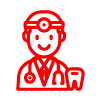Out with the Old, In with the New: Replacing Your Toothbrush and Other Forgotten Dental Habits
Jan 22 , 2025
Good oral hygiene is more than just brushing twice a day—it involves keeping up with the small but essential habits that often go unnoticed. One of the most overlooked aspects of dental care is replacing your toothbrush regularly, but it’s not the only forgotten habit that can impact your oral health.
If you’re looking for a fresh start for your teeth, it’s time to ditch old habits and adopt better ones. Here’s how to ensure your oral care routine stays effective and your smile stays healthy.
1. When to Replace Your Toothbrush
Most people don’t think about replacing their toothbrush until it looks noticeably worn out. However, the American Dental Association (ADA) recommends changing your toothbrush every three to four months or sooner if the bristles become frayed.
Using an old toothbrush reduces its effectiveness in cleaning your teeth and removing plaque. Worn-out bristles can also become rough, causing gum irritation. Additionally, bacteria can accumulate on an old toothbrush, increasing the risk of infections.
Tip: If you’ve been sick, replace your toothbrush immediately to prevent reintroducing bacteria into your mouth.
2. Brushing Too Hard or Not Enough
Brushing regularly is crucial, but how you brush matters just as much as how often. Brushing too hard can wear down enamel and damage gums, leading to sensitivity and recession. On the other hand, not brushing long enough leaves behind plaque and bacteria that contribute to cavities and gum disease.
Best practice:
- Use gentle circular motions rather than scrubbing aggressively.
- Brush for at least two minutes each time.
- Choose a soft-bristled toothbrush to prevent damage.
3. Ignoring Your Tongue
The tongue is a breeding ground for bacteria that contribute to bad breath and oral infections. Yet, many people forget to clean their tongue as part of their routine.
Solution: After brushing your teeth, use your toothbrush or a tongue scraper to gently remove bacteria from your tongue. This simple habit can significantly improve your oral hygiene and keep your breath fresh.
4. Forgetting to Floss
Flossing is often neglected, but it’s just as important as brushing. It removes plaque and food particles from between the teeth—areas your toothbrush can’t reach. Skipping flossing leads to plaque buildup, cavities, and gum disease.
How to make flossing a habit:
- Keep floss near your toothbrush as a reminder.
- Use floss picks or water flossers if traditional flossing feels difficult.
- Set a daily goal and stick to it until it becomes second nature.
5. Not Replacing Your Toothbrush Holder
Most people rinse their toothbrush but rarely clean or replace their toothbrush holder. This can lead to bacteria and mold buildup, contaminating your brush and increasing the risk of infections.
Tip: Wash your toothbrush holder regularly with hot, soapy water and let it dry completely. If it shows signs of mold or excessive grime, it’s time for a replacement.
6. Using the Wrong Mouthwash—or Skipping It Entirely
Mouthwash can enhance oral hygiene by killing bacteria, freshening breath, and reducing plaque buildup. However, using an alcohol-based mouthwash too frequently can cause dry mouth, leading to more bacteria growth.
Choose an alcohol-free, fluoride-based mouthwash to protect your enamel and prevent cavities while keeping your breath fresh.
7. Skipping Dental Check-Ups
Many people only visit the dentist when they feel pain or suspect a problem. However, regular dental check-ups help catch issues before they become serious.
Why regular visits matter:
- Professional cleanings remove tartar buildup that brushing and flossing miss.
- Early detection of cavities, gum disease, and oral cancer can prevent more serious issues.
- Your dentist can provide personalized recommendations for better oral care.
Aim for at least two dental visits per year for cleanings and check-ups.
8. Drinking Too Many Sugary or Acidic Beverages
Soda, fruit juice, and sports drinks can erode enamel and lead to cavities. Even coffee and tea can stain teeth and contribute to plaque buildup.
Tips to protect your teeth:
- Drink water throughout the day to rinse away sugars and acids.
- Use a straw when drinking acidic beverages to minimize direct contact with teeth.
- Brush or rinse 30 minutes after consuming sugary drinks to prevent damage.
9. Chewing on Ice or Using Teeth as Tools
Chewing on hard objects like ice, pens, or fingernails can lead to cracked or chipped teeth. Similarly, using your teeth to open packaging or cut things puts unnecessary stress on them.
Break the habit: Keep sugar-free gum handy if you need something to chew on, and always use the right tools instead of your teeth.
10. Neglecting Hydration and a Healthy Diet
A dry mouth increases the risk of cavities and bad breath, as saliva helps wash away bacteria and food particles. Drinking plenty of water and eating tooth-friendly foods like dairy, leafy greens, and nuts can strengthen enamel and prevent decay.









